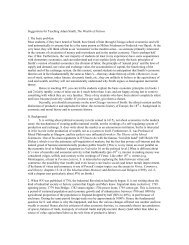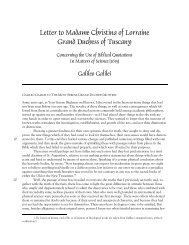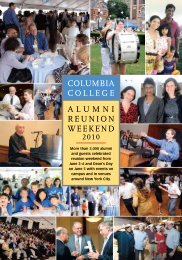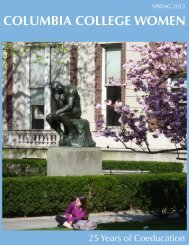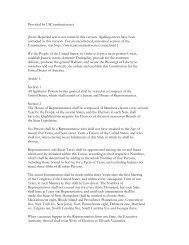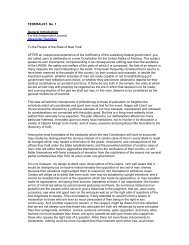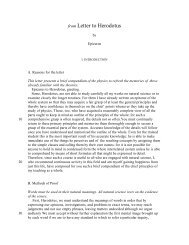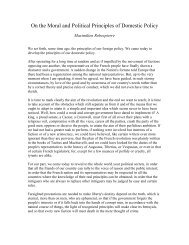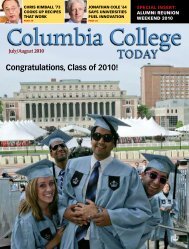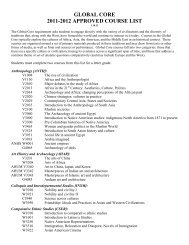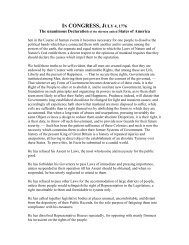Download this issue as a PDF - Columbia College - Columbia ...
Download this issue as a PDF - Columbia College - Columbia ...
Download this issue as a PDF - Columbia College - Columbia ...
Create successful ePaper yourself
Turn your PDF publications into a flip-book with our unique Google optimized e-Paper software.
CLASSIC READINGS, MODERN TECHNOLOGY<br />
COLUMBIA COLLEGE TODAY<br />
COLUMBIA COLLEGE TODAY<br />
CLASSIC READINGS, MODERN TECHNOLOGY<br />
Students in Lit Hum are expected, in the words of Dean James J.<br />
Valentini, to “engage with others in a broad way about big ide<strong>as</strong><br />
specific to the human condition.”<br />
PHOTO: MATTHEW SEPTIMUS<br />
My Adventures with Homer, Rousseau, Woolf and other Indestructible<br />
Writers of the Western World (1996) — in which Denby described<br />
retaking the Core in middle age (see <strong>Columbia</strong> Forum in <strong>this</strong> <strong>issue</strong>)<br />
— Harvard professor Helen Vendler bemoaned “<strong>Columbia</strong>’s tendency<br />
with literary texts, which is to f<strong>as</strong>ten on the political and the<br />
moral over the erotic or aesthetic or epistemological; and such an<br />
emph<strong>as</strong>is is a standing invitation to correctness or incorrectness.”<br />
Nevertheless, <strong>this</strong> emph<strong>as</strong>is on examining the human condition,<br />
approached through powerful and resonant works of literature,<br />
remains central to the Lit Hum experience and to a <strong>Columbia</strong><br />
<strong>College</strong> education. As Edward Mendelson, the Lionel Trilling<br />
Professor in the Humanities, says, Lit Hum is a “course about<br />
problems people have never been able to solve.”<br />
Kathryn Yatrakis, dean of academic affairs and senior <strong>as</strong>sociate<br />
v.p. for Arts and Sciences, underscores Lit Hum’s value <strong>as</strong> a<br />
bridge: “It provides a common intellectual experience that binds<br />
students to each other, and to generations of alumni.”<br />
Here’s the answer to the most common question <strong>as</strong>ked<br />
about Literature Humanities: The Iliad, Oresteia, Oedipus<br />
the King and Inferno. The question: What are the<br />
texts that have been read in Lit Hum every year since<br />
the course w<strong>as</strong> first required That’s it — four texts. (King Lear<br />
would make the cut were it not for several years when the syllabus<br />
only required students to read one Shakespeare play, leaving<br />
it to the teachers of each section to decide which one.)<br />
For those who perceive Lit Hum <strong>as</strong> a staid, inflexible “great<br />
Hutchins’ original experiment at Chicago and the successful program<br />
at St. John’s <strong>College</strong> (in Annapolis and Santa Fe). Lit Hum<br />
always h<strong>as</strong> been flexible about which texts it uses, and remains so.<br />
Indeed, <strong>this</strong> flexibility calls into question whether “great books” is<br />
an accurate description of the course at all.<br />
The books that make it, explains Mercer, are the “books that<br />
people keep commenting on,” just <strong>as</strong> Virgil mined Homer but<br />
adapted him to the exigencies of imperial Rome. Mendelson says<br />
Lit Hum embraces “books that people have been arguing about.”<br />
The point isn’t that everyone likes them or agrees about them, he<br />
says. “The point is they’re disturbing.”<br />
Williams agrees. “To read these texts is to introduce yourself<br />
to being unsettled about life,” he says. The course “is intended to<br />
raise more questions than it answers, and to nurture a curiosity<br />
about written human experience.”<br />
Non-<strong>Columbia</strong>ns often don’t appreciate the significance of apparently<br />
incremental changes. “What is <strong>as</strong>tonishing about <strong>Columbia</strong>’s<br />
Core offerings is how little they have changed over the years,”<br />
says The Boston Globe columnist Alex Beam, who surveyed the “great<br />
books” movement at Chicago, St. John’s and <strong>Columbia</strong> in A Great<br />
Idea at the Time: The Rise, Fall, and Curious Afterlife of the Great Books<br />
(2008). (Beam is the father of Christopher ’06.) But the faculty who<br />
teach the course disagree. “The course h<strong>as</strong> never been the same because<br />
the context h<strong>as</strong> always changed,” says Williams. “The generation<br />
of WWII had a different experience from the first Humanities<br />
A students,” and the Cold War, civil rights and women’s rights, he<br />
says, all affected the context in which the course w<strong>as</strong> taught.<br />
Lit Hum On Exhibit<br />
For those who can’t get enough Literature Humanities,<br />
two 75th anniversary exhibits and an ongoing web exhibit<br />
offer the chance to go deeper.<br />
An exhibit in the Hamilton Hall lobby highlights the material<br />
history of the Lit Hum texts, emph<strong>as</strong>izing that they are not only<br />
intellectual creations but also objects of craftsmanship, manufacture,<br />
publication and distribution. Two display c<strong>as</strong>es focus on<br />
the contributions of John Erskine (Cl<strong>as</strong>s of 1900) and Jacques<br />
Barzun ’27, ’32 GSAS to the creation and evolution of the course.<br />
The <strong>Columbia</strong> Alumni Center also will have a 75th anniversary<br />
exhibit, set to open in March.<br />
<strong>Columbia</strong> University Libraries’ Rare Book & Manuscript Library,<br />
meanwhile, h<strong>as</strong> established an online exhibit, “Core Curriculum:<br />
Literature Humanities” (along with a companion exhibit<br />
about Contemporary Civilization) featuring materials from the<br />
RBML collections. Among the items are a papyrus fragment of<br />
Homer’s Iliad dating from the first century BCE, an illuminated<br />
manuscript of Ovid’s Metamorphoses and early editions of Pride<br />
and Prejudice and To the Lighthouse. View these and more at<br />
exhibitions.cul.columbia.edu/exhibits/show/lit_hum.<br />
Lit Hum is a “course about problems<br />
people have never been able to solve.”<br />
The books that make the syllabus are the<br />
“books that people keep commenting on.”<br />
which were the backbone of reading <strong>as</strong>signments in Contemporary<br />
Civilization for decades and which have made a comeback<br />
at <strong>Columbia</strong> in recent years.<br />
More importantly, the approach matters. Any entering firstyear<br />
expecting a formal literature course is likely to be surprised<br />
by Literature Humanities, because the<br />
course’s ambitions are so much broader. As<br />
Dean James J. Valentini says, students in Lit<br />
Hum are expected to “engage with others in a<br />
broad way about big ide<strong>as</strong> specific to the human<br />
condition.”<br />
It’s fair to say that <strong>this</strong> approach — what Valentini<br />
describes <strong>as</strong> “thinking in a broad way <strong>as</strong><br />
a civilized person” — h<strong>as</strong> puzzled many, both<br />
on and off campus. In the early 1960s, a <strong>College</strong><br />
committee reviewing Lit Hum chaired by Professor<br />
Fritz Stern ’46, ’53 GSAS, now University<br />
Professor Emeritus, had difficulty understanding<br />
“the philosophical or pedagogical ends of<br />
the course.” While the committee didn’t suggest<br />
abandoning Lit Hum, it noted that the traditional<br />
justifications — such <strong>as</strong> thinking in a<br />
broad way about books — were “scorned by the<br />
committee.” Similarly, in a savage New Republic<br />
review of David Denby ’65, ’66J’s Great Books:<br />
Christia Mercer, the Gustave M. Berne<br />
Professor of Philosophy, says, “Every<br />
generation h<strong>as</strong> to reinvent Lit Hum.”<br />
PHOTO: MATTHEW SEPTIMUS<br />
books” course, four texts is not a long list. Indeed, anyone who<br />
looks to Lit Hum for a fixed canon that all educated people<br />
should read is likely to be disappointed. Humanities A initially<br />
used most of Erskine’s original syllabus, <strong>as</strong> had the earlier colloquium.<br />
But the course’s administrators have since adapted<br />
the syllabus regularly to reflect faculty and<br />
student interests. Molière and Voltaire were<br />
represented for decades but have fallen off;<br />
in the p<strong>as</strong>t 20 years, most students have read<br />
Cervantes, Austen and Dostoevsky.<br />
Gareth Williams, the Violin Family Professor<br />
of Cl<strong>as</strong>sics and chair of Lit Hum, speaks for<br />
many instructors in rejecting the idea of a fixed<br />
list of “cl<strong>as</strong>sic” books. “As a cl<strong>as</strong>sicist, I object<br />
to that sort of viewpoint. The course is not a<br />
museum-like visit. It’s about the interrogation<br />
of texts,” he says. “I <strong>as</strong>k my students, why on<br />
earth read that book now”<br />
Mercer puts it another way: “We need to<br />
get the students to read the books and feel the<br />
importance of them.”<br />
The variety of texts that have appeared<br />
on the syllabus during the l<strong>as</strong>t 75 years distinguishes<br />
Lit Hum both from great books<br />
programs, such <strong>as</strong> President Robert Maynard<br />
“Every generation h<strong>as</strong> to reinvent Lit Hum,” agrees Mercer.<br />
That h<strong>as</strong> never been more true than today. “The Lit Hum experience<br />
now is completely different from 20 years ago because our<br />
students grew up with the Internet,” Williams says. “Students’<br />
minds work differently,” he adds, because they are used to e<strong>as</strong>y<br />
and immediate access to information.<br />
Paradoxically, that makes Lit Hum more valuable than ever. Lit<br />
Hum encourages the process of “slowly unfolding a steady stream<br />
of argument,” says Williams, for students “accustomed to nearly<br />
instantaneous communication.” He believes that “certain are<strong>as</strong> of<br />
the human experience resist the technological hand,” and in Lit<br />
Hum, students “learn to formulate, deliver and defend arguments,<br />
both in speech and in writing.” And they learn to listen. “The art<br />
of listening is a fundamental <strong>as</strong>pect of Lit Hum,” Williams says.<br />
This is not to give the impression that Lit Hum encourages<br />
a community of modern-day Luddites, rejecting<br />
technology and the Internet in favor of dog-eared paperbacks<br />
full of scribbles. Nothing could be further<br />
from the truth. Under Mercer’s leadership, Lit Hum h<strong>as</strong> developed<br />
a rich online presence to supplement cl<strong>as</strong>s readings and<br />
discussion.<br />
The thinking behind the website (college.columbia.edu/core/<br />
lithum/texts), says Mercer, w<strong>as</strong> to make Lit Hum more intellectually<br />
engaging for students, more a part of their lives on campus.<br />
“We wanted to present Lit Hum <strong>as</strong> edgy <strong>as</strong> it really is,” she says.<br />
The goal w<strong>as</strong> to make the course “more alive, more vital.” Mercer<br />
wanted students to be able to explore the contemporaneous<br />
worlds and artistic interpretations of their readings.<br />
Using the theme of “explorations,” the website allows students<br />
to delve not simply into the context of Lit Hum texts but<br />
also into the conversations that have flowed from them. For The<br />
Iliad, for example, the website includes ancient depictions of the<br />
Trojan War from cl<strong>as</strong>sical pottery and sculpture, examples of ancient<br />
arms and armor, and Renaissance depictions. But it also includes<br />
modern works, including streaming music — Bob Dylan’s<br />
“Temporary Like Achilles” (1966) and Led Zeppelin’s “Achilles<br />
L<strong>as</strong>t Stand” (1976) — <strong>as</strong> well <strong>as</strong> a clip from the blockbuster film<br />
Troy (2004), starring Brad Pitt <strong>as</strong> Achilles. Other texts are accompanied<br />
by materials ranging from Hedwig and the Angry Inch (a<br />
2001 musical about a rock ’n’ roll band with a transgendered German<br />
lead singer) to Pride and Prejudice and Zombies (2009), a somewhat<br />
irreverent artistic response by Seth Grahame-Smith to Jane<br />
Austen’s m<strong>as</strong>terpiece.<br />
The website, says Williams, contextualizes readings and connects<br />
students to the history of discussion about them. “The website<br />
frames the texts,” he says. “It provides supportive picturing.”<br />
Mercer sees <strong>this</strong> <strong>as</strong> an aid to instructors <strong>as</strong> well. “Teachers<br />
have to finesse how much time they spend on context in cl<strong>as</strong>s,”<br />
she notes. The website makes <strong>this</strong> an e<strong>as</strong>ier t<strong>as</strong>k. It also provides<br />
SPRING 2013<br />
20<br />
SPRING 2013<br />
21



